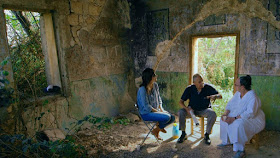From the outset of JOSÉ, the new, near-documentary-style narrative film from Li Cheng (shown below; this is his second full-length feature), we're immersed in the life of Cheng's protagonist, the titular José, as this young man goes about his work life, family life and sex life -- far too trudgingly, it must said, in all three areas.
José's work consists mostly of coraling cars that drive by to stop and purchase some food at a local restaurant that does not, it would seem, have a parking lot. He takes the order, runs back into the restaurant to place it, and brings that order back to the car after it has been driven around the block a few times. (Or so it seemed to the eyes of TrustMoves, at least.)
José's poor mom -- and the family is poor: behind on its rent and probably much else, too -- labors day and night, cooking food and selling it on the street (if the authorities don't come and chase her away). There is also a brother we never see who doesn't help the family with its rent or with anything else, so it falls to José to pick up the slack.
Regarding sex, as José is gay, he makes hook-ups via cell phone on whatever Grinder-like app is used in Guatemala, where he resides. If the word Guatemala brings to mind a generally well-received movie we covered that opened theatrically just three months ago -- Temblores (Tremors) -- also set in Guatemala with startlingly similar subject matter: that of a gay man trying to negotiate his way to come out of the closet. The difference, however (and it's a huge one), is that the protagonist of Temblores comes from an uber-wealthy family.
It is via José's sexual encounters that we come to view and understand this young man most clearly. With these, he can be honest in ways he cannot be elsewhere in this life. In the first of these, there clearly has been nothing available but get-your-rocks-off sex; in the second, with a sensitive, hot-looking immigrant, Luis (Manolo Herrera, below. right), sex coupled to caring and genuine attraction by both parties leads to the possibility of a relationship.
But here, the differences between a young man with local roots and another without them come to the fore. Later, we meet a new paramour, an attractive, seemingly decent older man who holds out the promise of some security and caring. But José still pines for Luis.
How all this plays out offers the viewer a number of rewards: A look at street-level Guatemalan society and its many challenges; yet another Latin American country mired in an unhelpful, traditional patriarchy (the situation of José's female co-worker, above, may put you in mind of Roma); and how modernity is impacting on all of this.
As director and co-writer (with George F. Roberson), Mr. Cheng manages to give us quite a lot of information and buried emotion via visuals as much as from dialog (one excellent scene that offers the reverse involves José and his grandmother, above). This is key in helping us empathize, connect to and appreciate our protagonist, as well as the rest of the characters.
From what I can gather the filmmaker has used exclusively newcomers/ unprofessional actors in all the roles. Yet due, I am guessing, to his uncanny knack for casting and his ability to draw good performances from an untutored cast, there is not an untruthful moment in the whole movie.
Cheng thankfully does not try to tie up a bunch of loose ends. While it is clear that José has grown up some during the course of the film and now has a better idea of what he wants and needs in this life, it is not nearly as clear that he will be able to achieve this. But it's a start. And the finale, taking place in the film's lushest and most verdant of locations, is simply a knockout to view.
From Outsider Pictures and running a just-right 86 minutes, José opens tomorrow, Friday, January 31, in New York City at the Quad Cinema, and the following Friday, February 7, in Los Angeles (at Laemmle's Royal) and Chicago (at the Gene Siskel Film Center), and then on February 14 in South Florida at Miami's Tower Theater, Fort Lauderdale's Classic Gateway, the AMC Aventura, the Living Room Theaters in Boca Raton and at the Lake Worth Playhouse. To view all currently scheduled playdates, cities and theaters, click here and scroll down.






















































